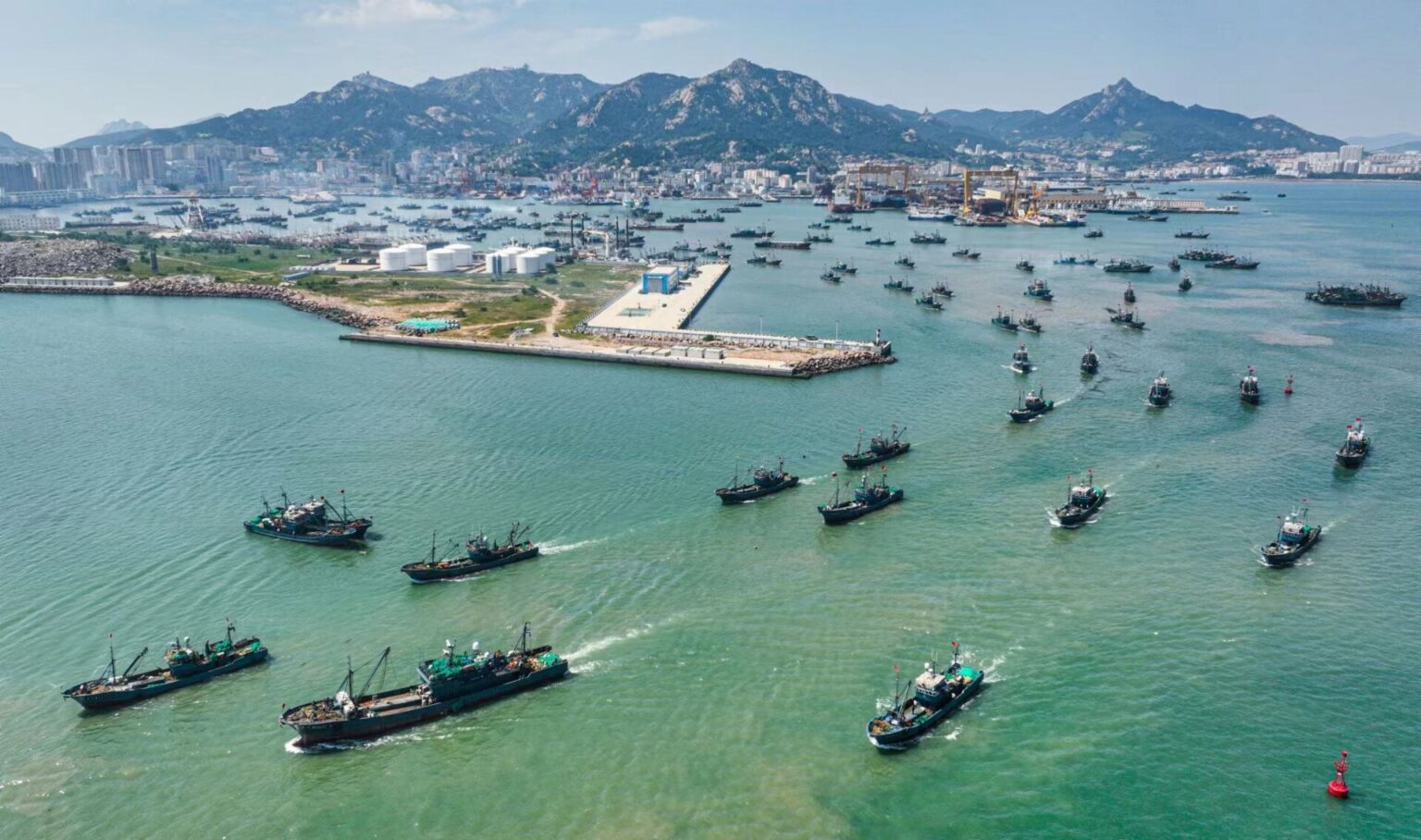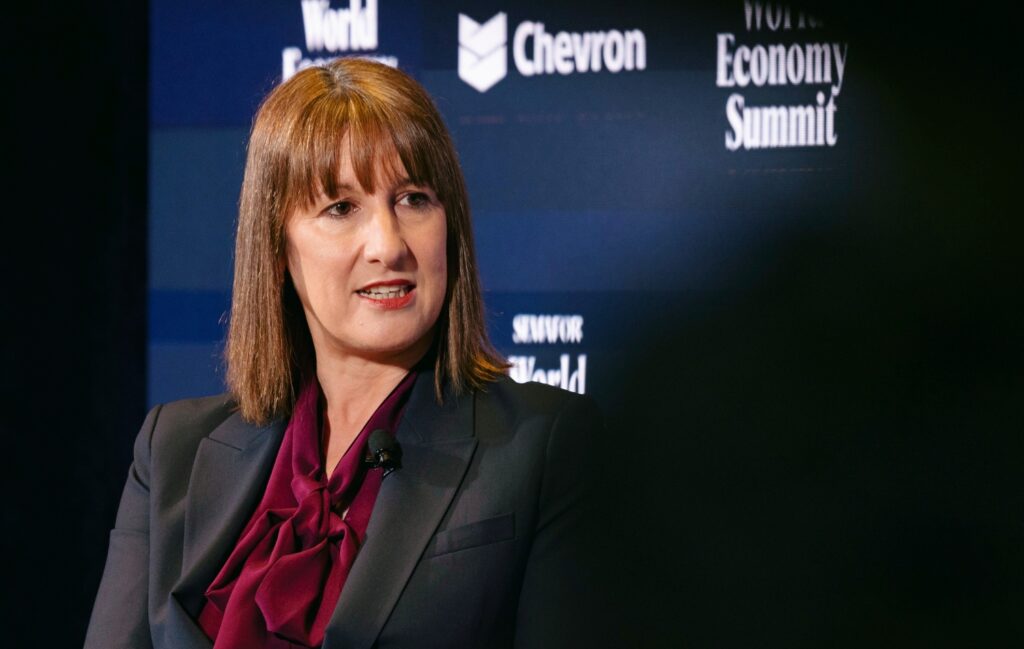Britain is facing calls to impose import controls on China after an investigation revealed that supermarkets are sourcing seafood from companies exploiting forced labour by minority Uyghurs.
The Outlaw Ocean Project documented the forcible transfer of more than a thousand Uyghurs and members of other Muslim minorities 2,000 miles from their homes in landlocked Xinjiang to 10 fish processing plants in the coastal province of Shandong since 2018.
Some of these facilities supply British and European seafood wholesalers, who in turn sell to supermarkets including Tesco, Sainsbury’s, Waitrose, Morrisons and other retailers; caterers supplying pubs, hotels and restaurants, schools and universities; and the National Health Service, the four-year investigation found.
The U.S. government has described China’s actions in Xinjiang as a form of genocide. At least a million Uyghurs have been forced into detention camps over the past six years, where they are subjected to beatings, torture, forced sterilisation and political re-education. China has also made widespread use of biometric surveillance and forcibly put Uyghurs to work in Xinjiang’s cotton fields, or in other industries around the country, according to human rights groups.
The Uyghurs sent to work in seafood plants are kept under tight control, including patrols by uniformed guards; monitoring by officials to increase their daily output and “enthusiasm”; dormitory searches for forbidden items, such as Qurans; and compulsory “patriotic education” sessions in which they are made to learn about the Chinese Communist party’s ethnic policy, according to The Outlaw Ocean Project’s findings.
“The investigation is shocking, no one should ever be treated in that way and work in those conditions,” Sian Lea, business and human rights manager at London-based human rights nonprofit organisation Anti-Slavery International, told DeSmog.
“To protect people around the world so no one is exploited in supply chains, we need strong laws that compel companies to take action to mitigate the risk of forced labour,” Lea said.
The organisation wants the UK to introduce carefully-crafted import controls to combat imports made with state-imposed forced labour, such as China’s exploitation of Uyghurs.
With its domestic fishing industry in long-term decline, the UK imports more than 80 percent of its seafood. China was the third-largest supplier in 2022, with the UK importing £278 million worth of Chinese seafood, compared to £164 million in 2012, according to Seafish, a public body.
To investigate the use of forced labour in opaque fish processing plants, The Outlaw Ocean Project hired investigators to visit some of the sites, and reviewed local news reports; hundreds of pages of internal company newsletters; and thousands of social media videos showing Uyghur workers from Xinjiang, verified in part with the help of language specialists.
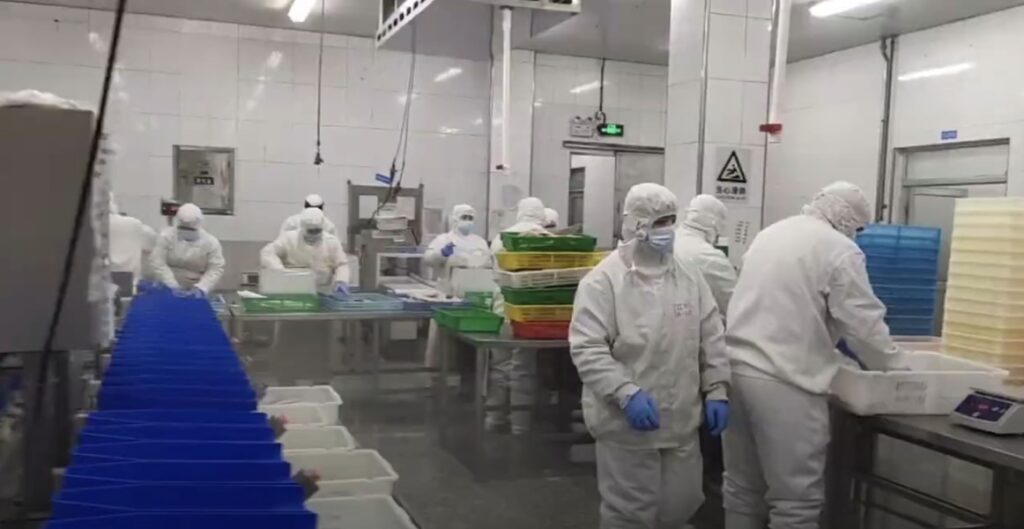
Captive Labour on the High Seas
The team also spent months investigating dire conditions in China’s distant-water fishing fleet, following Chinese ships in four high-seas fishing grounds, occasionally boarding the vessels to speak to crews, and contacting them and their families via social media to understand the conditions onboard.
While forced labour by Uyghurs takes place in seafood processing plants on shore, Chinese fishing vessels have traditionally relied heavily on foreign workers, particularly from Indonesia, often hiring them through recruitment firms with hidden costs that amount to debt bondage. Since the pandemic, Chinese fishing companies have focused on recruiting impoverished workers from rural China, or other similarly desperate applicants who see the punishing life of a deckhand as their best employment option.
The Outlaw Ocean Project used satellite tools and databases with ownership information about Chinese fishing vessels and seafood companies to track the movement of squid and white fish to wholesalers around the world. The researchers published an interactive graphic showing their communications with hundreds of companies, organisations and agencies about their findings, and a “bait-to-plate” interactive tool tracing seafood from ships and processing plants to downstream brands and consumers, including what is known about possible crimes or other types of concerns within these supply chains.
Almost half of the distant-water fishing fleet investigated by The Outlaw Ocean Project was tied to violations of human rights or environmental regulations, with cases of forced labour identified on 29 squid fishing vessels, and the risk of forced labour on 59 others.
Journalists collected evidence of wage withholding; beatings of deckhands; the confiscation of passports; deprivation of food and drinking water; and deaths from neglect or violence, affecting Chinese and foreign workers. The Outlaw Ocean Project also found that workers catching export-bound squid may be forced to stay offshore for more than three years, subjecting them to the risk of diseases such as beriberi, caused by a shortage of the vitamin B1 found in fresh fruits and vegetables, leading to some deaths.
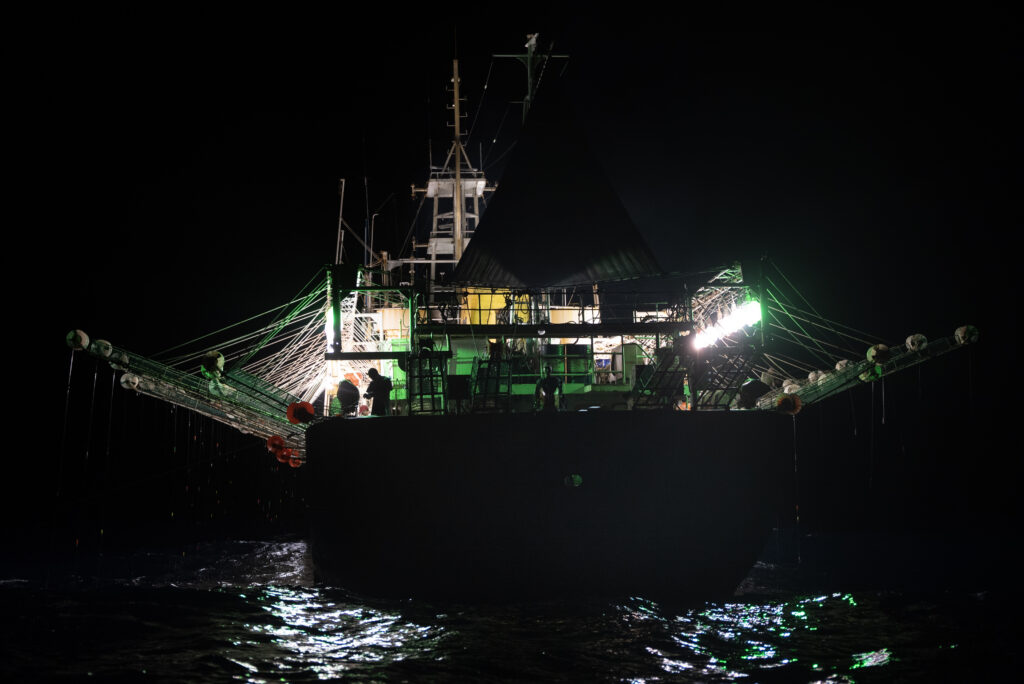
‘International Scrutiny’
The UK government introduced the Modern Slavery Act in 2015 to combat forced labour in supply chains, but critics say the legislation has had limited impact because it relies on voluntary efforts by companies.
In March 2021, the UK imposed travel bans and asset freezes on four senior Chinese officials, and an asset freeze on the Public Security Bureau of the Xinjiang Production and Construction Corps., which it said was responsible for violations against Uyghurs in Xinjiang. Dominic Raab, the then foreign secretary, described the situation in Xinjiang as “one of the worst human rights crises of our time.”
The Outlaw Ocean Project’s findings prompted Anti-Slavery International to renew a call it made last year for the UK government to introduce a Business Human Rights and Environment Act to require companies, financial institutions, and the public sector to conduct human rights and environmental due diligence across their supply chains, and hold them accountable if they fail to prevent harm.
The Outlaw Ocean Project’s findings have also triggered calls for tighter regulation in other major markets for Chinese seafood. The investigation established that the U.S. government has purchased more than $200 million of seafood linked to Uyghur forced labour for schools, military bases and prisons.
Government suppliers in France, Sweden, Germany and the Netherlands have also purchased seafood processed by Chinese plants associated with human rights violations, the investigation found.
The U.S. government has taken a tougher stance than the European Union or UK on forced Uyghur labour, with Congress passing an act in 2021 that presumes that all goods produced “wholly or in part” in Xinjiang or by the region’s minorities involved state-imposed forced labor. The legislation has led to the seizure of more than a billion dollars worth of goods, including electronics, clothing and pharmaceuticals — although seafood had largely escaped attention prior to the publication of The Outlaw Ocean Project’s findings last month.
Kenneth Roth, former executive director of Human Rights Watch, has noted that the UK government has so far failed to follow Washington’s lead in creating a presumptive ban on imports from Xinjiang, and that a parliamentary bill to that effect appears to be going nowhere.
Roth told DeSmog that attempts to stop the use of Uyghur forced labour “cannot settle for gestures and platitudes.”
“The battle must be fought with the same persistence and creativity that the Chinese government puts into avoiding international scrutiny of its use of Uyghur forced labour,” he said.
The UK Department of Business and Trade said the government was working with international partners to tackle the problem.
“We have published guidance on the risks of doing business in Xinjiang, enhanced the UK’s export controls and will introduce financial penalties under the Modern Slavery Act,” a spokesperson said.
After the UN High Commissioner for Human Rights released a 2022 report stating that China’s treatment of Uyghurs violated human rights, China defended its actions in Xinjiang as “counter-terrorism”, and said that “the accusation that its policy is ‘based on discrimination’ is groundless.” A spokesperson for China’s mission to the UN added that the international community should “see through the clumsy performances and malicious motives of anti-China forces in the U.S. and the West, who attempt to use Xinjiang to contain China.”
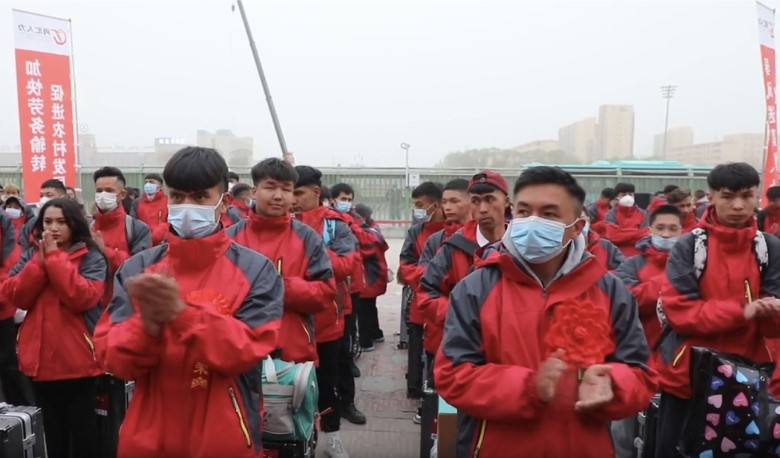
Tainted Supply Chains
The Outlaw Ocean Project found that at least two major European importers of pollock and cod had purchased seafood from Chinese suppliers who use Uyghur forced labour: British company Unibond Seafood International, and Netherlands-based NorthSeafood Holland.
Both Unibond Seafood International and NorthSeafood Holland supply New York Stock Exchange-listed Nomad Foods, which owns the popular Bird’s Eye brand sold throughout Britain and Europe. Bird’s Eye products are stocked by major food retailers in the UK including ASDA, Co-op, Iceland, Morrisons, Ocado, Sainsbury’s, Tesco and Waitrose.
Unibond Seafood International also supplied Young’s Seafood, one of the UK’s leading fish suppliers, which says that its products account for about 40 percent of all the fish retailed in the UK each year. Most of the UK’s major food retailers — including ASDA, Co-op, Iceland, Morrisons, Ocado, Sainsbury’s, Tesco and Waitrose — stock a wide range of Young’s Seafood cod and pollock products, The Outlaw Ocean Project found.
Young’s Seafood products are also used in own-brand products sold by Aldi, ASDA, Co-op, Iceland, Tesco and Waitrose, as well as Sainsbury’s “Responsibly Sourced” pollock fish fingers, the investigation found.
Young’s Seafood and Nomad Foods-owned Bird’s Eye have also supplied white fish to the UK healthcare, public education and university sectors through food service providers, including to primary and secondary schools in England.
The investigation found that Aldi’s brands Fishmonger and The Tasty Catch, which contain squid and calamari products, have made use of ingredients supplied by a seafood processor that buys seafood from fishing vessels with documented human rights abuses.
The investigation also found that Fastnet Fish, a UK seafood distributor, buys products from the Shandong Meijia Group, which uses forced Uyghur labour in seafood plants that export pollock, mackerel, squid, salmon, Pacific rockfish and shrimp globally.
Fastnet Fish states on its website that its customers include Iceland (for its own-brand smoked haddock and pollock fillets) and Westbridge Foods Ltd, a British subsidiary of the largest shrimp farming company in the world, Thailand-based Charoen Pokphand Foods.
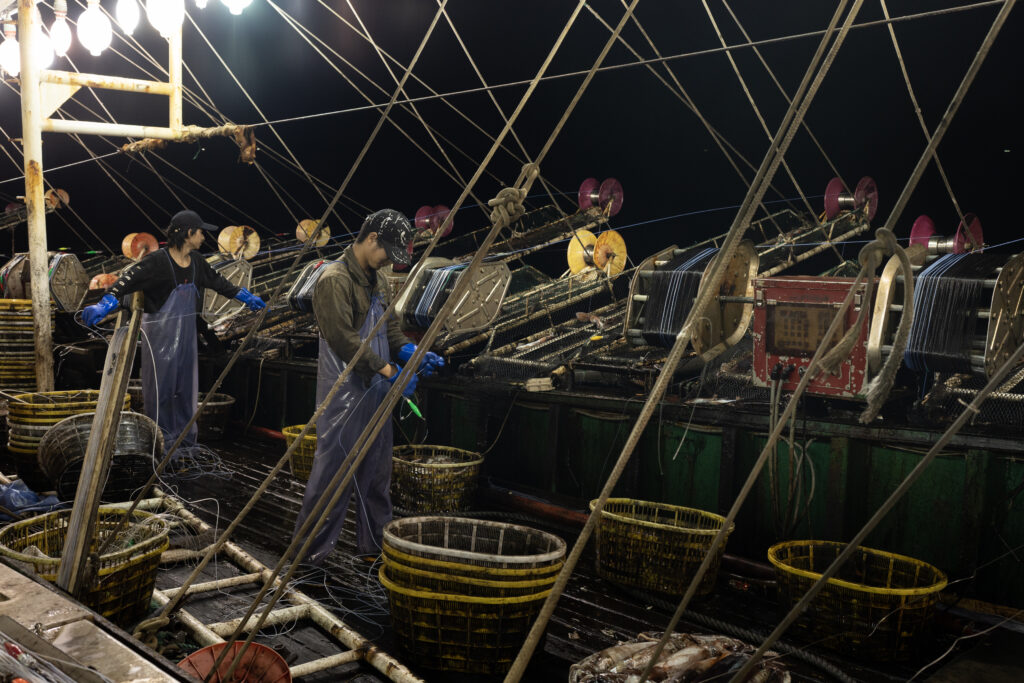
‘Horrified’
A spokesperson for Young’s Seafood told DeSmog that the company takes the allegations of forced labour in its supply chain “extremely seriously” and has launched an independent investigation in response to The Outlaw Ocean Project’s findings.
ASDA told DeSmog that it did not source seafood ingredients for its own-branded products from two of the Chinese exporters identified by The Outlaw Ocean Project as using Uyghur forced labour. ASDA also said it had no relationship with NorthSeafood Holland, which the investigation found to have received shipments from companies using forced labour.
Tesco and Lidl directed DeSmog to a statement from the British Retail Consortium: “Protecting the welfare of people and communities in supply chains is fundamental to our members’ sourcing practices. Forced labour has no place in our retailers’ supply chains, and any practices that fall short of our high standards will not be tolerated.”
Morrisons told DeSmog that it was “liaising with [its] suppliers to ensure that these concerns are fully investigated.”
Sainsbury’s said that the company took immediate action if it had any reason to believe that its supply chains were in breach of its high ethical and worker welfare standards. “We are working together with our suppliers and wider industry partners to understand the situation and take the most responsible and appropriate next steps,” a Sainsbury’s spokesperson said.
John Lewis, which owns Waitrose, said it expected suppliers to comply with its responsible sourcing code of practice. “We continue to look into the issues raised by The Outlaw Ocean Project regarding seafood products stocked across UK supermarkets,” a spokesperson said.
Unibond Seafood International said it was “very surprised” to learn of allegations of forced labour against Qingdao Tianyuan, a Chinese processing plant that has used Uyghur forced labour since 2018, and as recently as 2023, according to the investigation. The company added that seafood from Qingdao Tianyuan accounted for a “negligible part” of its supply, and said it is committed to “sourcing products exclusively from suppliers that have been thoroughly vetted and approved by renowned international auditing bodies.”
Fastnet Fish told the Outlaw Ocean Project that it was “horrified” upon learning of the use of forced labour, and would no longer source from the Shandong Meijia Group or any of its subsidiaries.
The Embassy of the People’s Republic of China in the United Kingdom, Shandong Meijia Group, NorthSeafood Holland, Aldi, Co-op, Iceland, Ocado, Westbridge Foods Ltd, Nomad Foods and the National Health Service did not respond to requests for comment.
Lea, of Anti-Slavery International, warned that the UK risked importing greater amounts of seafood tainted by human rights abuses if pressure generated by The Outlaw Ocean Project prompted other governments to bar Chinese goods made using forced labour.
“If other countries introduce such laws and the UK does not, it will increasingly be a ‘dumping ground’ for goods made with forced labour re-routed from other countries with stronger laws,” Lea said.
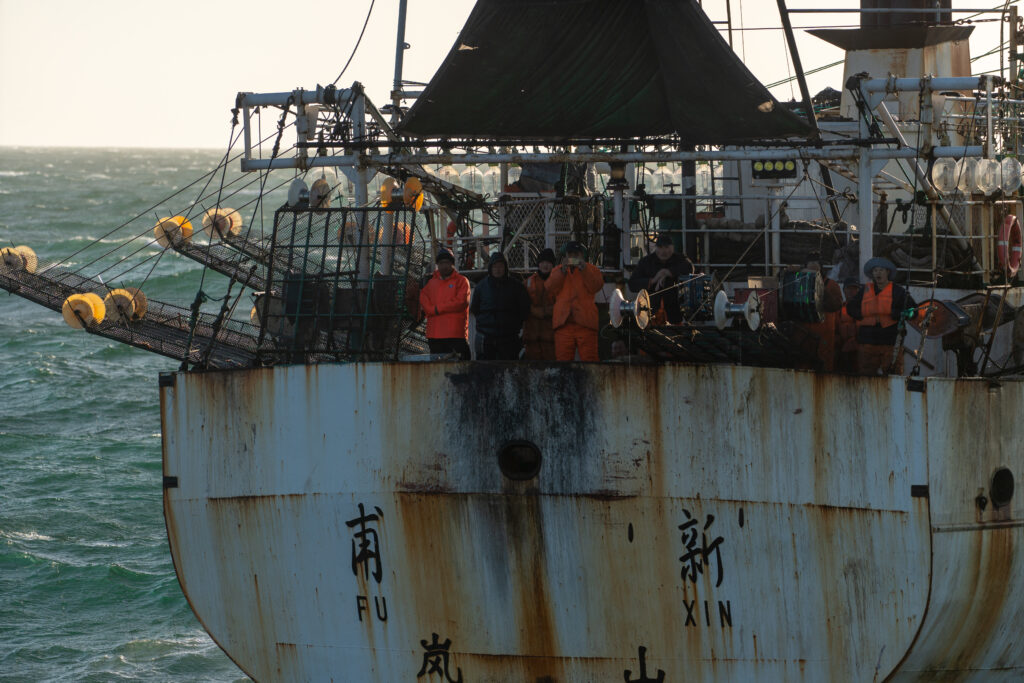
China has transformed itself in recent decades into a seafood superpower, and as part of that effort it has moved significantly into South American waters. Credit: © The Outlaw Ocean Project/Photographer: Ed Ou, February 27, 2022.
Subscribe to our newsletter
Stay up to date with DeSmog news and alerts


